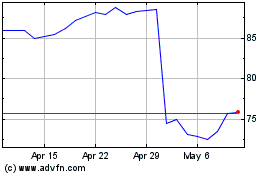Why Starbucks Expanded Its Transgender Health Benefits -- Journal Report
October 26 2019 - 8:29AM
Dow Jones News
By Maitane Sardon
Seven years ago, Tate Buhrmester made the decision to come out
as transgender while working as a supervisor at a Starbucks Corp.
store in Austin, Texas.
"When I came out at work, I told my Starbucks partners [as the
company calls its employees] to call me by my new name, Tate, and
they were very accepting. I never had any problems," he says.
Two things eased Mr. Buhrmester's transition: being able to
choose his preferred pronouns and name, and being covered by the
Seattle-based coffee chain's medical benefits.
Transitioning can be pricey for individuals who identify with a
gender other than the one listed on their birth certificate, as
many medical plans don't cover all of the procedures that are
available to complete the process. The cost of such surgeries can
add up quickly, with some people paying as much as $200,000 for
sex-reassignment surgery and related cosmetic procedures, according
to the World Professional Association for Transgender Health, or
WPATH.
That can lead transgender people to screen out certain companies
when looking for a job.
"I know a financial adviser who decided to join Starbucks
because the old employer didn't cover any surgery," says the
35-year-old Mr. Buhrmester.
Under the Affordable Care Act, which prohibits sex
discrimination by health providers and insurance companies, company
health plans in the U.S. can't specifically exclude
transition-related care. But the ACA's essential benefits also
don't include a list of procedures that health plans must
cover.
That means many transgender workers still pay for a good portion
of transition-related medical expenses out of their own
pockets.
That isn't the case at Starbucks, however, which in 2018 began
offering one of the most comprehensive health-benefits packages for
transgender workers in the U.S.
The company, which has been covering sex-reassignment surgery
since 2012, decided to expand coverage in 2018 to include
transition-related procedures that are considered cosmetic, such as
breast reduction or augmentation surgery, facial feminization,
voice therapy and hormonal therapy.
Starbucks consulted with WPATH when deciding which extended
benefits to offer. The organization gave Starbucks a list of
transgender care it should include and highlighted the benefits
many insurance companies exclude because they don't consider them
medically necessary.
"The WPATH told us we were the first company in the world to ask
them to help translate their recommended standards of care into a
medical benefits policy," says Ron Crawford, vice president of
benefits at Starbucks.
Starbucks decided to include procedures that many companies see
as cosmetic after experts and transgender people told them these
are "essential to becoming who they need to be," says Mr.
Crawford.
Experts say cosmetic procedures can help transgender people
overcome gender dysphoria -- the discomfort people may feel when
there is a conflict between their birth gender and the gender with
which they identify -- as well as anxiety and other mental
disorders.
"After I came out and transitioned, everything in my life
started to align with how I felt. I've also been more confident
since then," says Mr. Buhrmester.
Starbucks says the main driver behind its decision to offer such
comprehensive benefits stems from its desire to attract great
talent that is as diverse as the communities it serves. According
to a survey conducted by Deloitte, companies that embrace inclusion
are more likely to attract and retain workers, which is critical in
an economy where competition for talent is fierce.
"A key topic we hear about from our partners is the importance
of being able to bring their whole self to work, and how the fact
they can do that at Starbucks really makes our company stand out,"
says Lucy Lee Helm, Starbucks' executive vice president and chief
partner officer. "We know that by investing in our partners, we are
investing in the strength of the business."
Mr. Buhrmester says working in a company that is inclusive is
one of the reasons he has been at Starbucks for 15 years now.
"I am not very close to my family, so having the support of my
workplace has made a difference," says Mr. Buhrmester. "The fact
that I am trans hasn't overshadowed people's general perception of
me."
Ms. Sardon is a reporter for The Wall Street Journal in
Barcelona. Email her at maitane.sardon@wsj.com.
(END) Dow Jones Newswires
October 26, 2019 08:14 ET (12:14 GMT)
Copyright (c) 2019 Dow Jones & Company, Inc.
Starbucks (NASDAQ:SBUX)
Historical Stock Chart
From Mar 2024 to Apr 2024

Starbucks (NASDAQ:SBUX)
Historical Stock Chart
From Apr 2023 to Apr 2024
